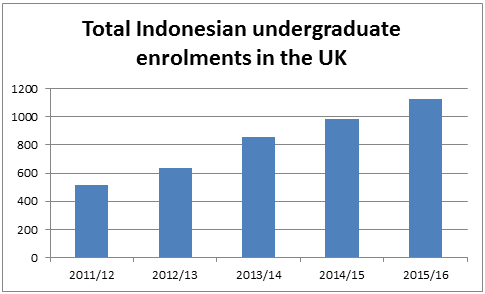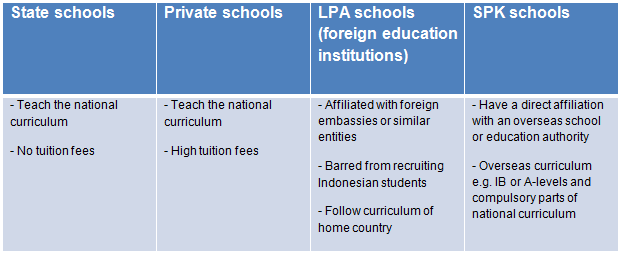
Indonesia rates as one of the most promising growth markets for student recruitment in Asia, with UK enrolments more than doubling over the past five years. Whilst the majority of Indonesian students in the UK are studying at the postgraduate level, undergraduate growth is picking up, rising by over 15 per cent annually over the past six years. With growing worries over affordability of Australian higher education and safety concerns in the USA there is increasing opportunity for the UK to expand its market share.*
Yet tapping into this opportunity requires a clear understanding of the academic strand of Indonesia’s secondary education – and the influencers contributing to study decisions.

Academic schools
In 2016 slightly over 1.5 million new students entered the academic strand of Indonesia’s secondary education, making up around 43 per cent of that year’s junior high school graduates. The academic strand is broken down into four categories: state schools, private schools, and two types of international schools.
The four types of school offer varying levels of recruitment potential.
SPK schools offer the greatest recruitment potential as they offer examinations which can lead to direct acceptance into overseas universities. But knowledge of different overseas higher education options at SPK schools remains relatively limited, and sustained marketing efforts can thus make a big difference in recruitment.
On the whole students from LPA schools, which enrol expatriate students, tend to be more knowledgeable about higher education options and thus more likely to be ranking-oriented when selecting a university. Most tend to choose universities in their home countries.
Private school tuition fees attract parents who are willing to invest in their children’s education and have the means to do so. As such these schools have greater potential for overseas student enrolment compared to state schools. Recruitment potential largely centres on foundation or pathway programmes to support students in reaching the standards required for international higher education institutions.
The majority of state school students who continue on to higher education generally do so domestically, although a small number consider studying overseas.
Connecting with key influencers
School counsellors play an important role in guiding students to choose the right study destination. Although all four types of school have counsellors, those at private and SPK schools tend to be much more involved in student decision-making.
School counsellors in Indonesia are still relatively unfamiliar with the UK education system; therefore proper training on the UK education system would be beneficial for counsellors and help raise awareness of specific institutions. The Network of Indonesian School Counsellors (NISC) established with the support of British Council is a network of school counsellors from SPK schools that gather and share relevant information that can help them support their students for higher education applications and could be a useful platform for institutions to engage with.
Indonesians frequently use agents to navigate any process that seems complicated or time-consuming and education is no exception. As such UK institutions should work on developing their agent networks through in country visits and sustained communication. WhatsApp is a common and acceptable way to communicate with agents and will often generate a faster response than emails.
Indonesian students who continue on to higher education are mostly self-funded and parents tend to play an important role in deciding where they study. Parent Associations tend to have a large and influential presence in Indonesian schools and are involved in holding events such as education fairs. Similarly, other family or friends with overseas study experience can sway student decisions, so it’s important to invest in alumni engagement.
Australia’s proximity and favourable visa policy will ensure that it remains the most popular overseas study destination for Indonesian students, but there is nonetheless potential for the UK to significantly increase its market share. With affordability and safety both favouring the UK ahead of Australia and the US, there is a window of opportunity. Targeting the right types of schools, building relationships and informing key influencers will enable UK institutions to capitalise on this trend and grow their Indonesian undergraduate student numbers.
*Student visa issuance growth for Indonesia showed a decline in the third quarter of 2017, largely due to changes in the government’s scholarship regulations. Indonesian government scholarships (LPDP) have contributed a lot to postgraduate student numbers in the UK, with the UK the number one destination of choice for scholarships awardees. However, this year internal restructuring of the LPDP has meant postponing the sending of awardees overseas, thus a decline in visa issuance. Any changes in LPDP regulations will not impact the potential of undergraduate recruitment.


Add new comment
Please note that comments by non-members are moderated. They do not appear on the site until they have been approved. Comments by registered members appear here immediately. Your email address will not be published. All fields are required.